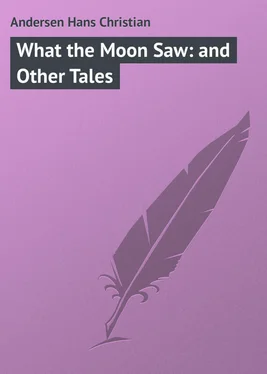Andersen Hans - What the Moon Saw - and Other Tales
Здесь есть возможность читать онлайн «Andersen Hans - What the Moon Saw - and Other Tales» — ознакомительный отрывок электронной книги совершенно бесплатно, а после прочтения отрывка купить полную версию. В некоторых случаях можно слушать аудио, скачать через торрент в формате fb2 и присутствует краткое содержание. Жанр: foreign_prose, на английском языке. Описание произведения, (предисловие) а так же отзывы посетителей доступны на портале библиотеки ЛибКат.
- Название:What the Moon Saw: and Other Tales
- Автор:
- Жанр:
- Год:неизвестен
- ISBN:нет данных
- Рейтинг книги:5 / 5. Голосов: 1
-
Избранное:Добавить в избранное
- Отзывы:
-
Ваша оценка:
- 100
- 1
- 2
- 3
- 4
- 5
What the Moon Saw: and Other Tales: краткое содержание, описание и аннотация
Предлагаем к чтению аннотацию, описание, краткое содержание или предисловие (зависит от того, что написал сам автор книги «What the Moon Saw: and Other Tales»). Если вы не нашли необходимую информацию о книге — напишите в комментариях, мы постараемся отыскать её.
What the Moon Saw: and Other Tales — читать онлайн ознакомительный отрывок
Ниже представлен текст книги, разбитый по страницам. Система сохранения места последней прочитанной страницы, позволяет с удобством читать онлайн бесплатно книгу «What the Moon Saw: and Other Tales», без необходимости каждый раз заново искать на чём Вы остановились. Поставьте закладку, и сможете в любой момент перейти на страницу, на которой закончили чтение.
Интервал:
Закладка:
Sixteenth Evening
Hear what the Moon told me. "I have seen the cadet who had just been made an officer put on his handsome uniform for the first time; I have seen the young bride in her wedding dress, and the princess girl-wife happy in her gorgeous robes; but never have I seen a felicity equal to that of a little girl of four years old, whom I watched this evening. She had received a new blue dress, and a new pink hat, the splendid attire had just been put on, and all were calling for a candle, for my rays, shining in through the windows of the room, were not bright enough for the occasion, and further illumination was required. There stood the little maid, stiff and upright as a doll, her arms stretched painfully straight out away from the dress, and her fingers apart; and oh, what happiness beamed from her eyes, and from her whole countenance! 'To-morrow you shall go out in your new clothes,' said her mother; and the little one looked up at her hat, and down at her frock, and smiled brightly. 'Mother,' she cried, 'what will the little dogs think, when they see me in these splendid new things?'"
Seventeenth Evening
"I have spoken to you of Pompeii," said the Moon; "that corpse of a city, exposed in the view of living towns: I know another sight still more strange, and this is not the corpse, but the spectre of a city. Whenever the jetty fountains splash into the marble basins, they seem to me to be telling the story of the floating city. Yes, the spouting water may tell of her, the waves of the sea may sing of her fame! On the surface of the ocean a mist often rests, and that is her widow's veil. The bridegroom of the sea is dead, his palace and his city are his mausoleum! Dost thou know this city? She has never heard the rolling of wheels or the hoof-tread of horses in her streets, through which the fish swim, while the black gondola glides spectrally over the green water. I will show you the place," continued the Moon, "the largest square in it, and you will fancy yourself transported into the city of a fairy tale. The grass grows rank among the broad flagstones, and in the morning twilight thousands of tame pigeons flutter around the solitary lofty tower. On three sides you find yourself surrounded by cloistered walks. In these the silent Turk sits smoking his long pipe, the handsome Greek leans against the pillar and gazes at the upraised trophies and lofty masts, memorials of power that is gone. The flags hang down like mourning scarves. A girl rests there: she has put down her heavy pails filled with water, the yoke with which she has carried them rests on one of her shoulders, and she leans against the mast of victory. That is not a fairy palace you see before you yonder, but a church: the gilded domes and shining orbs flash back my beams; the glorious bronze horses up yonder have made journeys, like the bronze horse in the fairy tale: they have come hither, and gone hence, and have returned again. Do you notice the variegated splendour of the walls and windows? It looks as if Genius had followed the caprices of a child, in the adornment of these singular temples. Do you see the winged lion on the pillar? The gold glitters still, but his wings are tied – the lion is dead, for the king of the sea is dead; the great halls stand desolate, and where gorgeous paintings hung of yore, the naked wall now peers through. The lazzarone sleeps under the arcade, whose pavement in old times was to be trodden only by the feet of high nobility. From the deep wells, and perhaps from the prisons by the Bridge of Sighs, rise the accents of woe, as at the time when the tambourine was heard in the gay gondolas, and the golden ring was cast from the Bucentaur to Adria, the queen of the seas. Adria! shroud thyself in mists; let the veil of thy widowhood shroud thy form, and clothe in the weeds of woe the mausoleum of thy bridegroom – the marble, spectral Venice."
Eighteenth Evening
"I looked down upon a great theatre," said the Moon. "The house was crowded, for a new actor was to make his first appearance that night. My rays glided over a little window in the wall, and I saw a painted face with the forehead pressed against the panes. It was the hero of the evening. The knightly beard curled crisply about the chin; but there were tears in the man's eyes, for he had been hissed off, and indeed with reason. The poor Incapable! But Incapables cannot be admitted into the empire of Art. He had deep feeling, and loved his art enthusiastically, but the art loved not him. The prompter's bell sounded; ' the hero enters with a determined air ,' so ran the stage direction in his part, and he had to appear before an audience who turned him into ridicule. When the piece was over, I saw a form wrapped in a mantle, creeping down the steps: it was the vanquished knight of the evening. The scene-shifters whispered to one another, and I followed the poor fellow home to his room. To hang one's self is to die a mean death, and poison is not always at hand, I know; but he thought of both. I saw how he looked at his pale face in the glass, with eyes half closed, to see if he should look well as a corpse. A man may be very unhappy, and yet exceedingly affected. He thought of death, of suicide; I believe he pitied himself, for he wept bitterly, and when a man has had his cry out he doesn't kill himself.
"Since that time a year had rolled by. Again a play was to be acted, but in a little theatre, and by a poor strolling company. Again I saw the well-remembered face, with the painted cheeks and the crisp beard. He looked up at me and smiled; and yet he had been hissed off only a minute before – hissed off from a wretched theatre, by a miserable audience. And to-night a shabby hearse rolled out of the town-gate. It was a suicide – our painted, despised hero. The driver of the hearse was the only person present, for no one followed except my beams. In a corner of the churchyard the corpse of the suicide was shovelled into the earth, and nettles will soon be growing rankly over his grave, and the sexton will throw thorns and weeds from the other graves upon it."
Nineteenth Evening
"I come from Rome," said the Moon. "In the midst of the city, upon one of the seven hills, lie the ruins of the imperial palace. The wild fig tree grows in the clefts of the wall, and covers the nakedness thereof with its broad grey-green leaves; trampling among heaps of rubbish, the ass treads upon green laurels, and rejoices over the rank thistles. From this spot, whence the eagles of Rome once flew abroad, whence they 'came, saw, and conquered,' our door leads into a little mean house, built of clay between two pillars; the wild vine hangs like a mourning garland over the crooked window. An old woman and her little granddaughter live there: they rule now in the palace of the Cæsars, and show to strangers the remains of its past glories. Of the splendid throne-hall only a naked wall yet stands, and a black cypress throws its dark shadow on the spot where the throne once stood. The dust lies several feet deep on the broken pavement; and the little maiden, now the daughter of the imperial palace, often sits there on her stool when the evening bells ring. The keyhole of the door close by she calls her turret window; through this she can see half Rome, as far as the mighty cupola of St. Peter's.
"On this evening, as usual, stillness reigned around; and in the full beam of my light came the little granddaughter. On her head she carried an earthen pitcher of antique shape filled with water. Her feet were bare, her short frock and her white sleeves were torn. I kissed her pretty round shoulders, her dark eyes, and black shining hair. She mounted the stairs; they were steep, having been made up of rough blocks of broken marble and the capital of a fallen pillar. The coloured lizards slipped away, startled, from before her feet, but she was not frightened at them. Already she lifted her hand to pull the door-bell – a hare's foot fastened to a string formed the bell-handle of the imperial palace. She paused for a moment – of what might she be thinking? Perhaps of the beautiful Christ-child, dressed in gold and silver, which was down below in the chapel, where the silver candlesticks gleamed so bright, and where her little friends sung the hymns in which she also could join? I know not. Presently she moved again – she stumbled; the earthen vessel fell from her head, and broke on the marble steps. She burst into tears. The beautiful daughter of the imperial palace wept over the worthless broken pitcher; with her bare feet she stood there weeping, and dared not pull the string, the bell-rope of the imperial palace!"
Читать дальшеИнтервал:
Закладка:
Похожие книги на «What the Moon Saw: and Other Tales»
Представляем Вашему вниманию похожие книги на «What the Moon Saw: and Other Tales» списком для выбора. Мы отобрали схожую по названию и смыслу литературу в надежде предоставить читателям больше вариантов отыскать новые, интересные, ещё непрочитанные произведения.
Обсуждение, отзывы о книге «What the Moon Saw: and Other Tales» и просто собственные мнения читателей. Оставьте ваши комментарии, напишите, что Вы думаете о произведении, его смысле или главных героях. Укажите что конкретно понравилось, а что нет, и почему Вы так считаете.












